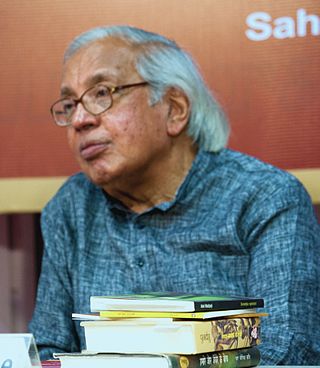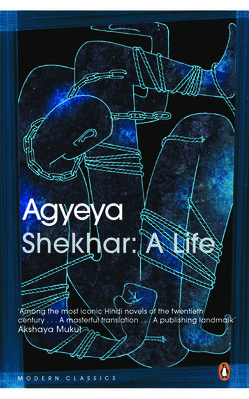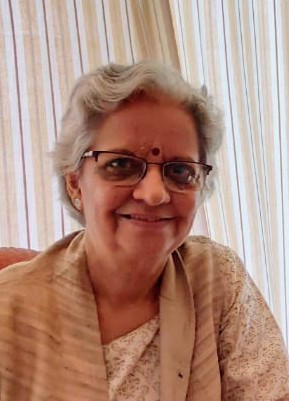
Ramdhari Singh, known by his pen name Dinkar, was an Indian Hindi language poet, essayist, freedom fighter, patriot and academic. He emerged as a poet of rebellion as a consequence of his nationalist poetry written in the days before Indian independence. His poetry exuded Veer Rasa, and he has been hailed as a Rashtrakavi and Yuga-Chāraṇa on account of his inspiring patriotic compositions. He was a regular poet of Hindi Kavi Sammelan and is hailed to be as popular and connected to poetry lovers for Hindi speakers as Pushkin for Russians.
Swadesh Bharati is a Hindi poet, recipient of "Premchand Award" and "Sahitya Bhushan Award". He lives in Kolkata from where he edits Rupambara, a literary bilingual quarterly journal. He has been in active field of creative writing since more than 45 years. He is chairman of Rashtriya Hindi Academy and was guest lecturer at Madaras Christian Academy.

Amritlal Nagar was one of the prominent Hindi writers of the twentieth century.

Gajanan Madhav Muktibodh was a prominent Hindi poet, essayist, literary and political critic, and fiction writer of the 20th century.

Kuber Nath Rai, also written as Kubernath Ray and Kuber Nath Ray, was a writer and scholar of Hindi literature and Sanskrit.
Dr. Ram Ratan Bhatnagar (1914-1992) was a Hindi scholar, professor in the Hindi Department at the University of Sagar, writer and critic of Hindi literature and poetry.
Mohan Chopra was a Hindi intellectual and author.
Kunwar Narayan was a poet in Indian literature in Hindi. He read and traveled widely and wrote for six decades. He was linked to the New Poetry movement.

Uday Prakash is a Hindi poet, scholar, journalist, translator and short story writer from India. He has worked as administrator, editor, researcher, and TV director. He writes for major dailies and periodicals as a freelancer. He has also received several awards for his collection of short stories and poems. With Mohan Das he received Sahitya Academi Awards in 2011. He is the first author to return his Sahitya Akademi award on September 3, 2015 against the killing of M. M. Kalburgi that initiated a storm of national protests by writers, artists, scholars and intellectuals.

Ashok Vajpeyi is an Indian Hindi-language poet, essayist, literary-cultural critic, apart from being a noted cultural and arts administrator, and a former civil servant. He was chairman, Lalit Kala Akademi India's National Academy of Arts, Ministry of Culture, Govt of India, 2008–2011. He has published over 23 books of poetry, criticism and art, and was awarded the Sahitya Akademi Award given by Sahitya Akademi, India's National Academy of Letters, in 1994 for his poetry collection, Kahin Nahin Wahin. His notable poetry collections include, Shaher Ab Bhi Sambhavana Hai (1966), Tatpurush (1986), Bahuri Akela (1992), Ibarat Se Giri Matrayen, Ummeed ka Doosra Naam (2004) and Vivaksha (2006), besides this he has also published works on literary and art criticism: Filhal, Kuchh Poorvagrah, Samay se Bahar, Kavita ka Galp and Sidhiyan Shuru ho Gayi Hain. He is generally seen as part of the old Delhi-centric literary-cultural establishment consisting of bureaucrat-poets and academicians like Sitakanta Mahapatra, Keki Daruwalla, J.P.Das, Gopi Chand Narang, Indra Nath Choudhari and K.Satchidanandan.
Girija Shankar Sharma is a historian and scholar of Rajasthani as well as Hindi language literature. He received a Master of Arts (M.A.) in History from Dungar College and a Doctor of Philosophy (Ph.D.) from the University of Rajasthan, Jaipur. He joined the Rajasthan State Archives (Bikaner) in 1963 and retired as deputy director of the Archives in 1996.
Ramesh Chandra Shah is an Indian poet, novelist, critic and the author of Sahitya Academy Award winning novel, Vinayak. He was honoured by the Government of India in 2004 with Padma Shri, the fourth highest Indian civilian award.

Sunita Jain (1941–2017) was an Indian scholar, novelist, short-story writer and poet of English and Hindi literature. She was a former professor and the Head of the Department of Humanities and Social Sciences at the Indian Institute of Technology, Delhi. She published over 80 books, in English and Hindi, besides translating many Jain writings and some Hindi literature into English. She is featured in the Encyclopedia of Post-Colonial Literatures in English and was a recipient of The Vreeland Award (1969) and the Marie Sandoz Prairie Schooner Fiction Award. The Government of India awarded her the fourth highest civilian honour of the Padma Shri in 2004. In 2015 she was awarded the Vyas Samman by the K.K. Birla foundation for outstanding literary work in Hindi. In 2015 she was awarded an honorary D.Litt. from the University of Burdhwan, West Bengal.
Girija Kumar Mathur was a notable Indian writer of the Hindi language. He is noted for his translation of the popular English song "We Shall Overcome" into Hindi. His father, Devicharan Mathur, was a teacher in a local school and greatly admired music as well as literature. His mother's name was Laxmidevi. Girijakumar Mathur is considered one of the most important writers in Hindi due to his efforts to modernise Hindi literature and promote it through many of his works.

Phoolchand Gupta is an Indian Hindi and Gujarati language poet, writer and translator. He hails from Himmatnagar, Gujarat, India. He made significant contributions to the Gujarati Dalit literature. Hindi Sahitya Akademi of state awarded him in 2013 for his book Khwabkhwahon Ki Sadi Hai. He won the Shafdar Hashmi Prize (2000) for his book Isi Mahol Mein.

Shekhar: Ek Jivani is an unfinished Hindi-language novel by Indian writer Sachchidananda Vatsyayan, also known by his pen-name, Agyeya. Published in two parts, with a third part that has yet to see the light of day, Ek Jivani is semi-biographical in nature and is considered to be Agyeya's magnum opus.
Tar Saptak or Taar Saptak is an anthology of Hindi language poems written by seven poets, published in 1943. Compiled by Sachchidananda Vatsyayan, it contain poems of Gajanan Madhav Muktibodh, Nemi Chandra Jain, Bharat Bhushan Agrawal, Prabhakar Machwe, Girija Kumar Mathur, Ram Vilas Sharma, and Agyeya himself. The publication of Tar Saptak has been seen as 'historically significant' event, as it influenced later development of modern Hindi poetry.
Trishanku is a 1945 collection of reflective essays in Hindi language by the Indian writer Sachchidananda Vatsyayan, that mostly deals with the concept of Indian and Western poetics.

Sudha Arora is an Indian author who writes in Hindi. She has published over 100 short stories, novels, and plays. Her works have been widely translated into various Indian and foreign languages. Some of them have also been adapted for television and stage. Her first story was published in September, 1965. She is a recipient of numerous local awards for her stories as well as for her contributions to Indian feminist literature in Hindi.
Bharat Bhushan Agarwal was a Hindi litterateur and poet who has been honored by Sahitya Akademi in 1978 for their poem Utna Vah Suraj Hai. He was also an important poet of Tar Saptak edited by Agyeya.











